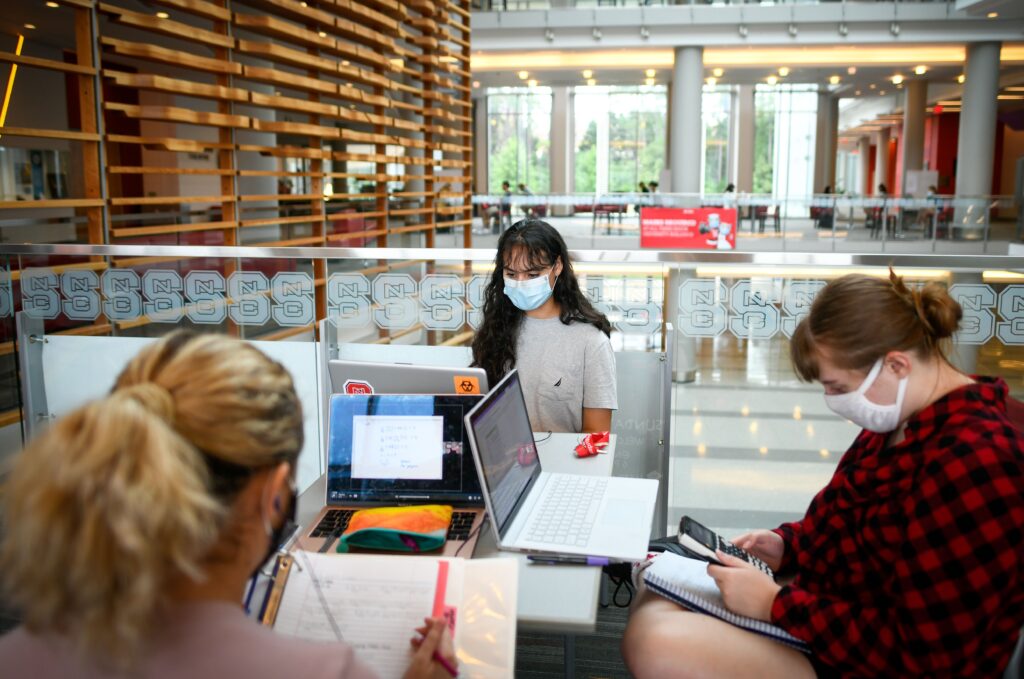
When the COVID-19 pandemic hit abruptly in March 2020, the Office of Information Technology (OIT) stood ready to provide campus IT infrastructure and services to help students, faculty and staff quickly adapt to online learning and remote work situations.
Among its priorities were making internal provisions for staff to remain safe, maintaining a reliable IT environment, and addressing campus needs to modify existing services or develop new ones due to the pandemic.
Securing the Pack
With students, faculty and staff accessing university resources remotely, cybersecurity-related issues became a huge concern. As a result, communicating security awareness resources and standing security requirements and practices was a high priority. OIT published Remote Work Resources and Guidelines to remind campus users of the resources available to help safeguard information such as REG 08.00.03 – Data Management Regulation and the Endpoint Protection Standard. Campus users were also reminded to use approved Storage Locations for University Data and Approved Alternate Antivirus Products.
In the midst of the pandemic, OIT moved forth with its plan to begin the enrollment of about 25,000 students in Google 2-Step Security and Duo Security to fight against cyberattacks and to help improve the university’s overall security posture. The two-factor authentication (2FA) enrollment began in August 2020 and the last student cohorts were onboarded in February 2021. Now 82,886 student and employee accounts are protected by 2FA, and new students and employees are enrolled in 2FA on an ongoing basis.
Serving the WolfPack Community Remotely
“During the pandemic, staff continued to provide the services that support seamless distant work,” says Marc Hoit, NC State chief information officer. “Most of these — including Jabber for phones, help desk remote tools, ServiceNow and call center systems, remote access to file space, and the virtual private network — were already in place and were supported flawlessly. “
Google Meet and WebEx (WolfMeeting) and Cloud, along with Zoom, which is supported by DELTA, provided users with video conferencing abilities to communicate and collaborate virtually from any location with internet services. Many Google Workspace productivity tools — including Google Chat, Drive, Sheets, Calendar and Gmail — and expanded live and on-demand workshops were available to help students and employees study and work online.
Supporting the University’s Mission
In addition, OIT responded to an influx of changes to existing campus services and brought new services online. They included:
- Classroom Capture
In preparation for the Wolfpack’s return to campus in fall 2020, DELTA and OIT teamed up last summer to upfit frequently used 110 learning spaces with much needed audio and visual technologies. The Classroom Capture team updated more than 100 spaces in eight weeks to support in-person, online and hybrid learning while also adhering to social distancing requirements. These general purpose classrooms are scheduled by the Department of Registration and Records. - Protect the Pack
In partnership with Emergency Management and Mission Continuity (EMMC), Student Health Services, Enrollment Management and Services (EMAS) and University Human Resources (UHR), OIT developed a return-to-campus attestation tracking and surveillance system to provide testing of on-campus students and employees to better Protect the Pack. This involved integrating data from the HealthyPack Portal Patient Records System, the HR system and the Student Information System (SIS), developing processes to monitor and notify designated participants, and developing an oversight dashboard to aid in the management of employee compliance.
OIT also implemented ServiceNow’s Vaccine Administration Management module to address the need to quickly vaccinate students, faculty and staff for COVID-19. This implementation effort was a collaboration between OIT Technology Support Services, EMMC, and Student Health Services.
- Going paperless
As a result of the pandemic, the need to go paperless accelerated for many campus colleges, departments and units. OIT expanded its OnBase imaging system to support paperless processing of Workers’ Compensation Settlements, Paid Administrative Leave, Emergency Loans, Student Health Integrated Care Referrals, and Human Resources records for the College of Design and the Poole College of Management. Approximately 529,000 documents were added to OnBase, bringing the total number of documents managed within OnBase to over 12.5 million.
ShareBase was also expanded to provide secure file upload services for units such as: Student Health Services, Office of Research Innovation (ORI), the College of Humanities and Social Sciences Center for Family and Community Engagement, Science House, Science Olympiad, EMMC, the College of Agricultural and Life Sciences Center for Environmental Farming Services, the College of Veterinary Medicine Department of Molecular Biomedical Science, the Finance Division, and the Chancellor’s Office.
- Implementing HR and SIS Changes
Throughout the pandemic, OIT dealt with numerous Student support and HR leave and payment changes.
- HR System modifications were made to support:
- Pandemic-related leave offerings such as Paid Administrative Leave (PAL), Families First Coronavirus Response Act (FFCRA) leave, and pandemic-related community engagement leave
- Furlough management; tax changes related to the updated leave provisions (FICA tax exemptions for PAL and FFCRA payments)
- Changes to COBRA benefits
- Onsite hours tracking and overtime payments for onsite work
- Mandatory employee statuses.
- SIS modifications were made to support changes for the:
- Academic calendars to include drop/add dates
- Graduate student employment
- Satisfactory Academic Progress, policies that require students to meet certain standards to be eligible to continue enrollment and receive financial aid
- A “sandbox” version of the classroom scheduling software, which was implemented to allow for “what if” scenario planning of various classroom layouts and new facilities that might be needed during the pandemic.
- OIT also captured additional data regarding section attributes to support data-driven decision making and academic impact assessments.
- HR System modifications were made to support:
Throughout these critical times, OIT worked tirelessly to provide dependable IT applications, systems and services that allowed the Wolfpack community to study and work securely and productively.
